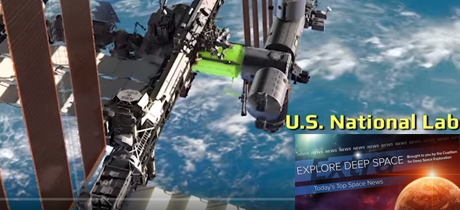In Today’s Deep Space Extra… A three person U.S. and Russian crew is preparing to launch to the International Space Station (ISS) early Thursday. Management of the ISS National Lab comes under criticism. Comets find the sun not so friendly.
Human Space Exploration
Rocket for next Space Station crew arrives on launch pad in Kazakhstan
Spaceflightnow.com (4/6): The launch of Russia’s Soyuz MS-16 crew, NASA’s Chris Cassidy and cosmonauts Anatoly Ivanishin and Ivan Wagner, to the International Space Station (ISS), will mark the first use of Russia’s upgraded Soyuz-2.1a rocket with crew aboard.
Report criticizes management of ISS National Laboratory
SpaceNews.com (4/7): NASA and its nonprofit partner in the oversight of the National Laboratory volume of the U.S. segment of the International Space Station (ISS) have pledged significant reforms in response to a report and recommendations issued this week by an independent review board. Anticipated changes include the establishment of an advisory committee to represent the Station’s science user community as well as changes to the nonprofit Center for the Advancement of Science in Space’s (CASIS) board the manages the use and operations of the National Lab assets.
SpaceX Dragon cargo craft leaves Space Station and splashes down in Pacific amid virus outbreak
Geekwire.com (4/7): SpaceX completed its 20th NASA contracted resupply mission to the International Space Station (ISS) on Tuesday, as a Dragon cargo capsule launched to the orbiting science lab in early March returned to Earth with 4,300 pounds of research gear and equipment in need of refurbishment. The freighter splashed down in the Pacific off the California coast about 3 p.m., EDT, or six hours after it departed the Space Station. SpaceX recovery vessels were standing by. The mission marked the end of a phase one resupply contract reached with NASA in December 2008.
Space Science
Astronomers battle space explorers for access to Moon’s far side
Scientific American (4/7): With a push on by the Earth’s space faring nations to establish a sustained human presence at the Moon, some scientists are concerned that human exploration could diminish the lunar far side’s science potential. One desire is the construction of a radio telescope that could explore deep space without interference from other broadcast signals.
It came from outside our solar system and now it’s breaking up
New York Times (4/7): Last fall, the solar system greeted Comet 2I/Borisov, a rare visitor from another star system. Now making its way out of the solar system, Borisov appears to be breaking up.
Oh no! Comet Atlas is fragmenting
Sky and Telescope (4/7): Comet Atlas, discovered in late December, has raised hopes of becoming so bright, perhaps as bright at Venus, it would become a “naked eye” comet as it made its closest approach to the sun in late May. However, images of Atlas just days ago, suggest Atlas may be fading and breaking up.
Other News
Space companies rally to supply medical equipment amid pandemic
Coalition Members in the News – Lockheed Martin, United Launch Alliance
Spaceflightnow.com (4/7): While striving to keep their engagement in space intact, companies like Blue Origin, Virgin Orbit and SpaceX have turned to the production of medical devices and protective equipment to help the health care industry deal with shortages in the face of the coronavirus pandemic.

